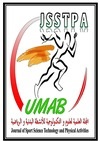La revue vise à contribuer au développement de la recherche scientifique dans le domaine des sciences et techniques des activités physiques et sportives, en encourageant les études originales alliant théorie et pratique, et en offrant une plateforme académique d’échange et de réflexion pour les enseignants, les chercheurs et les étudiants de troisième cycle.
Les thématiques abordées comprennent notamment :
- Sciences et techniques des activités physiques et sportives ;
- Entraînement sportif et sciences du mouvement ;
- Physiologie de l’effort ;
- Psychologie et sociologie du sport ;
- Éducation physique et sportive ;
- Technologies modernes dans le domaine sportif ;
- Gestion et management du sport ;
- Médecine du sport et traumatologie ;
- Éducation à la santé et activité physique préventive ;
- Méthodologie de la recherche scientifique en sciences du sport.
La revue encourage également les études interdisciplinaires et appliquées qui relient l’activité physique à des domaines tels que la santé, l’éducation, la nutrition, l’intelligence artificielle et l’innovation technologique dans le domaine sportif.



